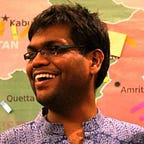Sports for Peace
(An edited version of this article was published in the April 2019 issue of Praxis Englisch, a magazine for Germans learning English.)
I have had an uneasy relationship with sports since childhood. While other children looked forward to playing, I found myself feeling awkward and out of place when I joined them. I do not have a single fond memory of those times. On most occasions, I was trying to cook up an excuse to run away.
From what I observed around me, sports used to bring out the worst in the boys at school and in my neighbourhood. Misogynistic cuss words were thrown around like small change. Even before I learnt what they meant, they made me uncomfortable. I suspect that even the boys who used them had no clue what they were saying. It was just something they had picked up from older boys.
Watching how aggressive and violent people could become made me feel unsafe. It seemed like one had to scream, push people around, use abusive language and crack vulgar jokes about girls in order to fit in. I tried hard but it did not work for me.
At that time, I was not as self-aware as I am today. I had no role models, vocabulary or Internet access to understand what it meant to be queer. Though I played cricket, football and badminton with other boys, I always felt excluded. Apart from being teased for being effeminate, I was bullied for being overweight. I was kicked, groped and sexually abused.
I was a gentle kid, and would cry easily. This made things even worse for me in spaces pumped up with the wild, heterosexual energy of boys competing with each other to be the best. I directed my attention to excelling in academics but I continued to be nagged by my parents and teachers to play. I am sure that their actions came from a feeling of concern about my physical fitness but they had no idea how traumatic it was for me to be on the playground.
It was only when I started exploring the field of peacebuilding and conflict resolution that I began to consider the beneficial aspects of sports such as breaking the ice between people from conflicting groups, connecting individuals through the pursuit of a common goal, promoting fair play, etc. In 2014, when I went to the Seeds of Peace International Camp in the United States of America as a delegation leader accompanying a contingent of high school students from India, I noticed that the participants who had gathered from various parts of the world were able to build stronger connections through sports rather than political dialogue.
They came from Palestine, Israel, Egypt, Jordan, Afghanistan, India, Pakistan, and USA, where they probably grew up with prejudices because of the ongoing conflicts between many of these countries. Sports engaged a part of their being that was not about correcting historical injustices but it gave them an opportunity to test their physical stamina, release suppressed emotions, channelize their energy in a constructive way, and work with people they would otherwise not want to cooperate with.
In the same year, I co-facilitated a summer camp called Planet Harmony for high school students at Rishikesh in India. They came from Manipur, Meghalaya, Kashmir, Chhattisgarh, Delhi and Gurgaon. These places are known for their rich cultural heritage but also for frequent instances of crime and violence. Since the aim of the camp was to build bonds of friendships between them, we decide to create enough time for them to enjoy rappelling, ziplining, river rafting, rock climbing and swimming apart from writing, storytelling and art activities. The students were happiest when they could play, challenge each other, strategize, cooperate and win.
There are numerous such initiatives, organizations and campaigns doing remarkable work all over the world. They enjoy varying degrees of success but they do bring in a fresh approach into an otherwise gloomy scenario. The Open Fun Football Schools were started in war-torn Bosnia and Herzegovina to bring children and adults across ethnic divides to play together and slowly begin to rebuild their lives after the conflict had officially ended.
Sport Allies in the United Kingdom is a charity that focuses on advocating against homophobia so that people who identify as LGBT+ can participate in sports alongside heterosexual sportspersons without any fear of discrimination. PeacePlayers International uses basketball to involve youth from divided communities in South Africa, Northern Ireland, the Middle East and the United States of America in leadership training, community service and peace education.
Learning about these projects has given me another perspective on sports. It is unfortunate that I had some terrible experiences but I now know that sports can play a meaningful role in people’s lives, build their self-esteem, and help them heal.
